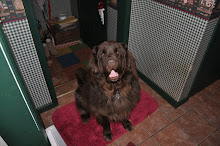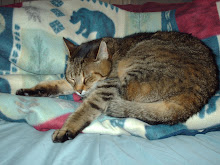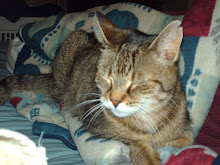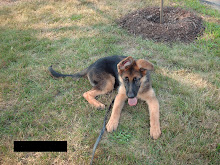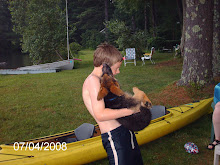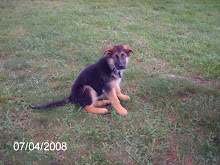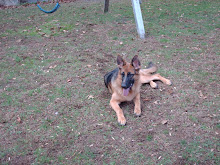Thursday, December 29, 2011
Wednesday, December 21, 2011
Bounty offered to wolf hunters, story says
Read more here.
Saturday, October 29, 2011
Friday, October 14, 2011
Watch for that moose
The moose was seen around 9 a.m., the agency said in a statement.
DEEP said it advises motorists to “slow down and drive defensively should a moose be spotted on or near the roadway,” the statement said.
“If motorists see this moose or any moose near a major highway, they should report it to the DEEP Environmental Conservation Police...and to local authorities,”the statement said.
DEEP police can be reached at 860-424-3333.
“September through October is the peak of the breeding season for Connecticut’s small but expanding moose population, which means an increase in moose movements and a greater potential for moose to cross roads,” the statement said.
“Moose, with their darker color and much taller stance, are particularly difficult to see at night and, once struck, are more likely to collapse through the vehicle windshield,” the statement said.
Tuesday, October 11, 2011
Fwd: Citi Pond at Bryant Park: 2nd Annual Family Day with Christmas Feet!
| |||||||||||||
--
Thursday, September 15, 2011
Thursday, August 25, 2011
A Story of Puppy and People Love
It wasn’t quite so easy for Tracy. She ended up in labor and gave birth in several different locations!
A chocolate Labrador Retriever, Tracy was kicked out of her home when she went into labor. The people with whom she lived decided that a mama dog and a passel of puppies was more trouble then she was worth on a Monday, so they called Animal Control in Union, South Carolina, to come and take her away.
Animal Control officers responded quickly and went to get Tracy. They also made an important call – one to a nearby animal sanctuary called Dreamweaver Farm, home of Carolina Poodle Rescue (CPR).
Tracy was no poodle. She had no fancy clip, no pedigree – only a new mother’s love and heart. Heather Sealy, head of animal control in Union County, has a big heart, too. Even though she was on vacation, she interrupted her own time off to make calls on Tracy’s behalf. She knew that even though Tracy wasn’t a poodle, the no-kill sanctuary at Dreamweaver Farm wouldn’t turn Tracy away.
And they didn’t.
CPR director Donna Ezell was on the way to the Animal Shelter to pick up a small dog when Heather’s phone call came in: Was there room at Dreamweaver Farm for … well, more than just one more.
Heather relayed how Tracy had given birth to Puppy 1 as the Animal Control personnel were taking her out of their truck. The puppy fell to the ground, but survived. By the time Donna reached the Union shelter, Tracy had given birth to Puppy 2 and Puppy 3.
Friday, May 13, 2011
West Haven Animal Shelter Gets Grant to Vaccinate Dogs for Influenza
Because CIV is relatively new, most dogs have not built up immunity to the disease. Dogs can get the disease by being exposed to those that have it, as well as playing with toys or drinking from bowls used by other dogs. People can also unwittingly spread the germ if they come in contact with infected dogs.
"Shelters and rescue organizations are often the first places that new diseases already in the community become evident. Dogs come in from the community and are released back into it, and often move to and from states with confirmed cases," said Liz Neuschatz, director of the Petfinder.com Foundation. "Canine flu can be a real problem for shelters, where one sick dog can cause an outbreak through an entire facility. We are pleased to be part of this effort to help protect the community by providing canine flu vaccine to West Haven Animal Shelter."
Dog flu is a growing problem throughout the U.S. It has been confirmed in 35 states so far, but tracking the disease is hard because it is so difficult to diagnose. Dogs are contagious before they show any symptoms. By the time the dog starts coughing, it's too late. Virtually all dogs exposed to the virus will become infected, and some will get more serious infections, such as pneumonia, which can be fatal. Dogs that go to doggie daycare, boarding facilities, groomers and shows and are vaccinated for canine cough (Bordetella) are also at risk for canine flu. Information about canine flu is available at http://www.doginfluenza.com/.
The grant for Building Community Immunity seeks to protect all at-risk dogs in the community, including those in close proximity with other dogs, as is the case with shelters and rescue facilities. It also provides greater assurance to adopting families that their new pets will be healthier and much less likely to be sick or get more serious, and sometimes fatal, infections. The grant further links Petfinder.com member shelter and rescue grant recipients with local veterinarians to protect all adoptable dogs in their care. The program promotes veterinary visits for wellness exams and, when appropriate, the second dose administration of Nobivac Canine Flu vaccine.
About Petfinder.com Foundation
The Petfinder.com Foundation was created in 2003 to respond to needs of its Petfinder member shelters and rescue groups and to assist them in ensuring that no pet is euthanized for lack of a home. The vaccine grant will help keep dogs healthy and adoptable.
About Intervet/Schering-Plough Animal Health
Intervet/Schering-Plough Animal Health, based in Boxmeer, the Netherlands, is focused on the research, development, manufacturing and marketing of animal health products. The company offers customers one of the broadest, most innovative animal health portfolios, spanning products to support performance and to prevent, treat and control disease in all major farm and companion animal species. Intervet/Schering-Plough Animal Health; subsidiaries of Merck & Co. Inc., Whitehouse Station NJ, USA. For more information, visit http://www.intervet.com/.
Tuesday, April 26, 2011
DEP Press Release - Be Bear Aware
The Connecticut Department of Environmental Protection (DEP) reminds residents to take steps to reduce contact and conflicts with bears. These steps are becoming increasingly important as bears emerge from winter hibernation looking for food and because the state's bear population is growing. This growing and expanding population is estimated at between 300 to 500 bears, increasing the need for people to know how to prevent problems. In 2010, the DEP received over 3,000 bear sighting reports from 115 of Connecticut's 169 towns. This spring, the DEP has already received several reports of bears coming into populated areas and interacting with humans and animals. When bears emerge from their winter dens, natural foods are scarce and, as a result, bears are often attracted to human-provided foods found near homes. On rare occasions they may attack livestock.
"As Connecticut's bear population continues to grow, residents of our state should familiarize themselves with steps they can take to avoid contact with this species," said Susan Frechette, Deputy Commissioner of the DEP. "Most unwanted contacts occur when bears are attracted close to homes by food – such as bird feed, refuse and residue on grills – that is made available to them. This can lead to more serious problems, including habituated bears that have lost their fear of humans. The best method to prevent problems with bears is to avoid feeding them by taking down bird feeders in the spring, keep garbage cans in a shed or a garage or tightly secured and keep outdoor cooking equipment clean."
The two most common food attractants are bird feeders and poorly-stored household garbage. Birdfeeders should be taken down and put away during spring, summer, and fall. Household garbage should be stored in closed garages or sheds. In cases where this can't be done, ammonia should be added to the garbage bags and cans to discourage pilfering by bears and other animals. Other items that can attract bears include pet and livestock foods, grease and drippings on barbecue grills, sweet or fatty food scraps in compost piles, and fruit on or dropped from trees.
Although uncommon, bears will attack and kill livestock, such as sheep, goats, pigs, and fowl. They also can destroy unprotected beehives. One of the best precautions for these problems is well-maintained electric fencing. Other recommendations for livestock growers include moving animals into sheds at night, keeping feed contained, keeping animals as distant from forested areas as possible, and using guard dogs.
The DEP encourages residents to take the following simple steps to avoid problems with black bears:
1. Never intentionally feed bears.
2. Take down, clean, and put away birdfeeders by late March. Store the feeders until late fall. Clean up spilled seed below feeder stations.
3. Store garbage in secure, airtight containers inside a garage or storage area. Double bagging and the use of ammonia will reduce odors that attract bears. Periodically clean garbage cans with ammonia to reduce residual odor. Garbage for pickup should be put outside the morning of collection and not the night before.
4. Avoid leaving pet food or dishes outdoors at night.
5. Keep barbecue grills clean. Store grills inside a garage or shed.
6. Avoid placing meat scraps or sweet foods in compost piles.
7. Protect beehives, livestock, and berry bushes from bears with electric fencing.
8. Keep dogs on a leash outdoors. A roaming dog might be perceived as a threat to a bear or its cubs.
If you encounter a bear while hiking, make your presence known by yelling or making other loud noises. Usually, a bear will move from an area once it detects humans. If a bear does not retreat, slowly leave the area and find an alternate hiking route. While camping, be aware that most human foods are also attractive to bears. Keep a clean campsite, and make sure food and garbage are secure (for example, keep food in a cooler stored in the trunk of a car).
Prevention and tolerance are the basis for learning to live with bears in Connecticut. It is important to remember that although black bears regularly travel near houses, they are rarely aggressive toward humans and can usually be frightened away by making loud noises, throwing sticks, or spraying with a garden hose. However, it is not uncommon for bears that have found food, such as birdseed from feeders, to ignore such disturbances. In the rare instance when a bear appears to be aggressive toward people, residents should contact the DEP Wildlife Division Sessions Woods office at 860-675-8130 (Mon.-Fri. from 8:30 AM-4:30 PM) or the DEP's 24-hour dispatch line (860-424-3333) during weekends and non-business hours.
Bear sightings reported by the public provide valuable information to assist the DEP Wildlife Division in monitoring the black bear population. Anyone who observes a black bear in Connecticut is encouraged to report the sighting on the DEP's Web site (www.ct.gov/dep) or call the Wildlife Division's Sessions Woods office. Some bears have been ear-tagged for research. Information on the presence or absence of tags, including tag color, letters and numbering is particularly valuable. To obtain informational fact sheets about bears, visit the DEP's Web site or call the Sessions Woods office.
Monday, April 18, 2011
Get a view to Prince William and his bride, and have tea at the Fairfield Public Library
Garcia taught European history at the college level and is on staff as a Reference Librarian in the Fairfield Public Library system. She has presented papers at academic conferences in the United States and Great Britain, and has publications in her field of English history, one of which has been included in the Royal Historical Society Bibliography.
Monday, April 11, 2011
Immune Therapy Can Control Fertility in Mammals
NEW YORK (March 31, 2011) -- Researchers at Weill Cornell Medical College have shown that it is possible to immunize mammals to control fertility. They say their technique could possibly be used on other mammals -- including humans -- because fertility hormones and their receptors are species-non-specific and are similar in both females and males. For pets, the technique could be an alternative to castration and adverse effects of hormone administration.
In the Feb. 24 online issue of Genetic Engineering and Biotechnology Journal, the researchers say their newly synthesized novel chimeric genes produce bi-functional recombinant proteins that are antigenic. The antibodies can tamp down production of progesterone in females and testosterone in males. The most immediate use of this technique might be to control fertility in dogs and cats or other mammals in need of population control, says the study's lead investigator, Dr. Brij B. Saxena, the Harold and Percy Uris Professor of Reproductive Biology at Weill Cornell Medical College.
After extensive preclinical testing for the efficacy, safety and reversibility in animals, the immune therapy might be possible in humans as a treatment for androgen excess syndromes as well as an immunological method to control fertility, adds Dr. Saxena.
The new chimeric gene was engineered by Dr. Saxena and his Weill Cornell colleagues, Dr. Meirong Hao and Dr. Premila Rathnam, and then inserted into insect cells to produce recombinant bi-functional protein. Immunity against fertility can be provided by the production of a bi-functional antibody by active or passive immunization using the recombinant protein.
This new gene contains DNA sequences from two natural genes that are integral to fertility in mammals. One portion is the extracellular domain (ECD) of the ligand (hormone) binding region of the human lutropin/human chorionic gonadotropin receptor (ECD-hLH-R), which is present in the ovaries and testes. The other component is the unique C-terminal peptide of the human chorionic gonadotropin β-subunit (hCG β-CTP).
Key to development of this new chimeric gene and recombinant protein is the researchers' finding that the hLH-R and hCG-β-CTP recombinant proteins are antigenic -- meaning that they can produce an immune response in the body, and produce bifunctional antibodies with dual effect. The antibodies are able to block the hormone binding to the receptor and thus suppress the signal to produce ovarian hormones, specifically progesterone. The second component of the antibody specific to hCG β-CTP would neutralize the hCG-like material produced by the fertilized egg prior to or at the time of implantation. This would lead to lack of stimulation to promote progesterone production by the corpus luteum, resulting in the lack of proliferation of endometrial growth that is vital for the implantation of the fertilized egg -- thus preventing pregnancy.
The scientists are now working on methods to upscale the production of recombinant chimeric protein to be tested as antigens in dogs and cats.
The study was funded by Concept-II, New York, NY.
Dogs, Dogs and More Dogs
 The Fidelco Open House from 10 a.m. to 2:30 p.m. April 16 includes tours of the Fidelco campus, a West Hartford police K-9 demonstration and interactive sessions on how Fidelco guide dogs are trained and utilized by clients.
The Fidelco Open House from 10 a.m. to 2:30 p.m. April 16 includes tours of the Fidelco campus, a West Hartford police K-9 demonstration and interactive sessions on how Fidelco guide dogs are trained and utilized by clients. 














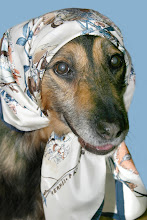



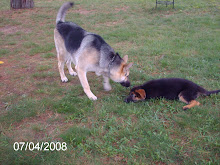
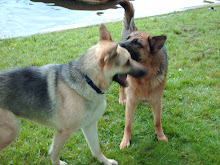
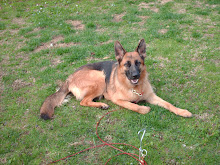
lr2.jpg)


